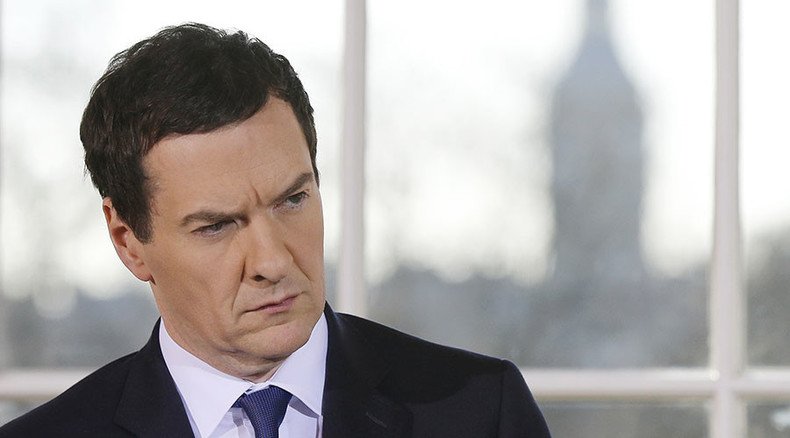Axman cometh: Osborne defies critics with fresh round of austerity

Chancellor George Osborne announced fresh spending cuts for several government departments on Monday in the wake of his embarrassing defeat in the House of Lords on tax credit cuts.
The environment, transport, local government and finance departments will have their day-to-day budgets, excluding capital expenditure, cut by an average 8 percent each year for the next four years, Osborne said.
The Chancellor insisted bringing the deficit down is essential for Britain’s economic security.
However, Shadow Chancellor John McDonnell described the policy as a “tactical ploy” to put pressure on Work and Pensions Secretary Iain Duncan Smith to cut Universal Credit for people on low incomes or out of work.
In his speech on Monday, Osborne said the country must not “lose its nerve” in the face of another round of austerity.
Tories "not welcome" in Manchester - anti-austerity protesters https://t.co/QiwaQFyXZo
https://t.co/weanHHs0Uy
— RT UK (@RTUKnews) October 3, 2015“If our country doesn’t bring the deficit down, the deficit could bring our country down,” he said. “That’s why, for the economic security of every family in Britain, the worst thing we could do now as a country is lose our nerve.”
Britain’s deficit was 4.9 percent of GDP in the year 2014/2015, despite efforts by Osborne to reduce it.
The UK’s national debt has increased steadily over the past five years by approximately £107 billion per annum. Government spending soared in the last decade by 48 percent of GDP following a series of costly bank bailouts.
McDonnell criticized the Chancellor’s economic record, citing Britain’s historically slow recovery.
“(Osborne’s) record to date is a disappointing one of cutting investment to the lowest of any developed economy, and the slowest economic recovery on record.”
In a series of tweets, the Shadow Chancellor said took a dig at Osborne’s promise of “economic security.”
“Osborne talks about security but people want the security of knowing their tax credits are not being cut. Why can’t he tell us now?”
Osborne talks about security but people want the security of knowing their tax credits are not being cut.Why can't he tell us now?
— John McDonnell MP (@johnmcdonnellMP) November 9, 2015“Osborne’s announcement of departments cuts is tactical ploy to isolate & pressurize [Iain Duncan Smith] on cuts to Universal Credit. Is IDS going to resign?”
Osborne's announcement of departments cuts is tactical ploy to isolate & pressurise IDS on cuts to Universal Credit.Is IDS going to resign?
— John McDonnell MP (@johnmcdonnellMP) November 9, 2015Duncan Smith has reportedly resisted attempts to make cuts to Universal Credit, a catch-all benefit payment which includes the former jobseekers’ allowance, housing benefit and income support.
Osborne is looking to make an additional £4 billion in savings in a bid to deliver a budget surplus of £10 billion by 2020.
However the Chancellor refused to confirm whether the next set of independent budget forecasts, due next month, will predict the £10 billion figure.
“It wouldn’t be right for me to try and anticipate those numbers,” he said. “A lot can happen over the coming years, and these forecasts move around, so that’s why I think you want a reasonably comfortable margin in delivering the surplus.”












